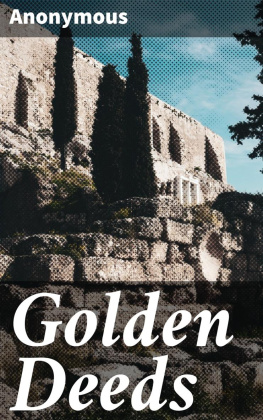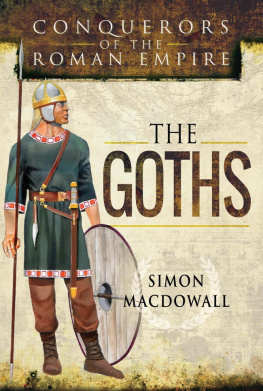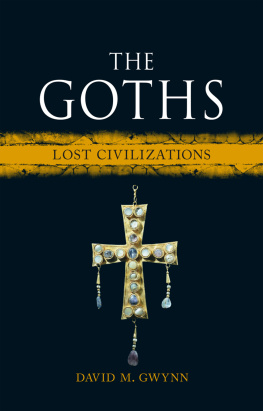Transcriber's Note:
The numbers in the right margin of the text are from the original book; although nothing in the book says so, it appears that they might be page numbers from the manuscript of which this is a translation. They are preserved in this transcription in the hope that they are indeed page numbers.
THE ORIGIN AND DEEDS OF THE GOTHS
by
JORDANES
in English Version
Part of a Thesis Presented to the Faculty of Princeton University for the degree of Doctor of Philosophy
by CHARLES C. MIEROW
Princeton
1908
NOTE
For the first time the story of the Goths recorded in the Getica of Jordanes, a Christian Goth who wrote his account in the year 551, probably in Constantinople, is now put in English form, as part of an edition of the Getica prepared by Mr. Mierow. Those who care for the romance of history will be charmed by this great tale of a lost cause and will not find the simple-hearted exaggerations of the eulogist of the Gothic race misleading. He pictured what he believed or wanted to believe, and his employment of fable and legend, as well as the nave exhibition of his loyal prejudices, merely heightens the interest of his story. Those who want coldly scientific narrative should avoid reading Jordanes, but should likewise remember the truthful, words of Delbrck: "Legende und Poesie malen darum noch nicht falsch, weil sie mit anderen Farben malen als die Historie. Sie reden nur eine andere Sprache, und es handelt sich darum, aus dieser richtig ins Historische zu bersetzen."
ANDREW F. WEST.
PREFACE
The following version of the Getica of Jordanes is based upon the text of Mommsen, as found in the Monumenta Germaniae Historica, Auctores Antiquissimi 5 (Berlin 1882). I have adhered closely to his spelling of proper names, especially the Gothic names, except in the case of a very few words which are in common use in another form (such as Gaiseric and Belisarius).
I wish to express my sincere thanks to Dean Andrew F. West of the Princeton Graduate School for his unfailing interest in my work. It was in one of his graduate courses that the translation was begun, three years ago, and at his suggestion that I undertook the composition of the thesis in its present form. He has read the entire treatise in the manuscript, and has been my constant adviser and critic. Thanks are also due to Dr. Charles G. Osgood of the English Department of Princeton University for reading the translation.
CHARLES C. MIEROW.
Classical Seminary,
Princeton University,
July 1908.
THE ORIGIN AND DEEDS OF THE GOTHS
(Preface)
Though it had been my wish to glide in my little boat 1 by the shore of a peaceful coast and, as a certain writer says, to gather little fishes from the pools of the ancients, you, brother Castalius, bid me set my sails toward the deep. You urge me to leave the little work I have in hand, that is, the abbreviation of the Chronicles, and to condense in my own style in this small book the twelve volumes of the Senator on the origin and deeds of the Getae from olden time to the present day, descending through the generations of the kings. Truly a hard command, 2 and imposed by one who seems unwilling to realize the burden of the task. Nor do you note this, that my utterance is too slight to fill so magnificent a trumpet of speech as his. But above every burden is the fact that I have no access to his books that I may follow his thought. Stilland let me lie notI have in times past read the books a second time by his steward's loan for a three days' reading. The words I recall not, but the sense and the deeds related I think I retain entire. To 3 this I have added fitting matters from some Greek and Latin histories. I have also put in an introduction and a conclusion, and have inserted many things of my own authorship. Wherefore reproach me not, but receive and read with gladness what you have asked me to write. If aught be insufficiently spoken and you remember it, do you as a neighbor to our race add to it, praying for me, dearest brother. The Lord be with you. Amen.
(Geographical Introduction)
[Sidenote: Ocean and Its Lesser Isles.]
I Our ancestors, as Orosius relates, were of the 4 opinion that the circle of the whole world was surrounded by the girdle of Ocean on three sides. Its three parts they called Asia, Europe and Africa. Concerning this threefold division of the earth's extent there are almost innumerable writers, who not only explain the situations of cities and places, but also measure out the number of miles and paces to give more clearness. Moreover they locate the islands interspersed amid the waves, both the greater and also the lesser islands, called Cyclades or Sporades, as situated in the vast flood of the Great Sea. But the impassable farther bounds of Ocean not only has 5 no one attempted to describe, but no man has been allowed to reach; for by reason of obstructing seaweed and the failing of the winds it is plainly inaccessible and is unknown to any save to Him who made it. But the 6 nearer border of this sea, which we call the circle of the world, surrounds its coasts like a wreath. This has become clearly known to men of inquiring mind, even to such as desired to write about it. For not only is the coast itself inhabited, but certain islands off in the sea are habitable. Thus there are to the East in the Indian Ocean, Hippodes, Iamnesia, Solis Perusta (which though not habitable, is yet of great length and breadth), besides Taprobane, a fair island wherein there are towns or estates and ten strongly fortified cities. But there is yet 7 another, the lovely Silefantina, and Theros also. These, though not clearly described by any writer, are nevertheless well filled with inhabitants. This same Ocean has in its western region certain islands known to almost everyone by reason of the great number of those that journey to and fro. And there are two not far from the neighborhood of the Strait of Gades, one the Blessed Isle and another called the Fortunate. Although some reckon as islands of Ocean the twin promontories of Galicia and Lusitania, where are still to be seen the Temple of Hercules on one and Scipio's Monument on the other, yet since they are joined to the extremity of the Galician country, they belong rather to the great land of Europe than to the islands of Ocean. However, it 8 has other islands deeper within its own tides, which are called the Baleares; and yet another, Mevania, besides the Orcades, thirty-three in number, though not all inhabited. And at the farthest bound of its western expanse 9 it has another island named Thule, of which the Mantuan bard makes mention:
"And Farthest Thule shall serve thee."
The same mighty sea has also in its arctic region, that is in the north, a great island named Scandza, from which my tale (by God's grace) shall take its beginning. For the race whose origin you ask to know burst forth like a swarm of bees from the midst of this island and came into the land of Europe. But how or in what wise we shall explain hereafter, if it be the Lord's will.
(BRITAIN)
[Sidenote: Caesar's two invasions of Britain B.C. 55-54]
II But now let me speak briefly as I can concerning 10 the island of Britain, which is situated in the bosom of Ocean between Spain, Gaul and Germany. Although Livy tells us that no one in former days sailed around it, because of its great size, yet many writers have held various opinions of it. It was long unapproached by Roman arms, until Julius Caesar disclosed it by battles fought for mere glory. In the busy age which followed it became accessible to many through trade and by other means. Thus it revealed more clearly its position, which I shall here explain as I have found it in Greek and Latin authors. Most of them say it is like a triangle pointing 11 between the north and west. Its widest angle faces the mouths of the Rhine. Then the island shrinks in breadth and recedes until it ends in two other angles. Its long doubled side faces Gaul and Germany. Its greatest breadth is said to be over two thousand three hundred and ten stadia, and its length not more than seven thousand one hundred and thirty-two stadia. In some parts 12 it is moorland, in others there are wooded plains, and sometimes it rises into mountain peaks. The island is surrounded by a sluggish sea, which neither gives readily to the stroke of the oar nor runs high under the blasts of the wind. I suppose this is because other lands are so far removed from it as to cause no disturbance of the sea, which indeed is of greater width here than anywhere else. Moreover Strabo, a famous writer of the Greeks, relates that the island exhales such mists from its soil, soaked by the frequent inroads of Ocean, that the sun is covered throughout the whole of their disagreeable sort of day that passes as fair, and so is hidden from sight.










